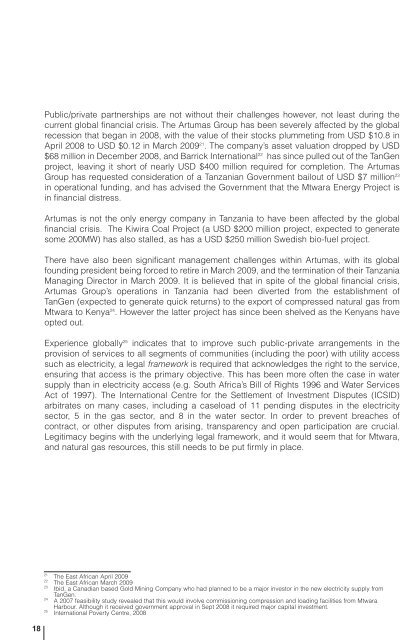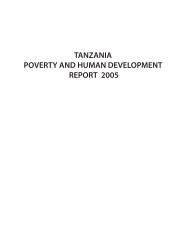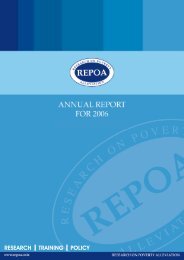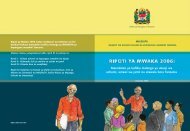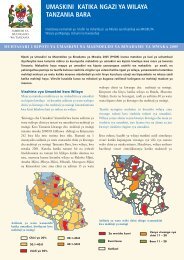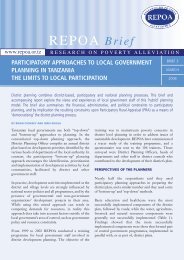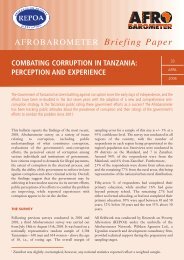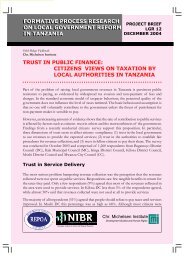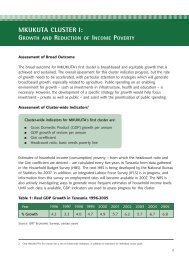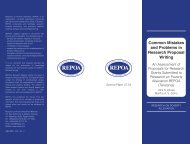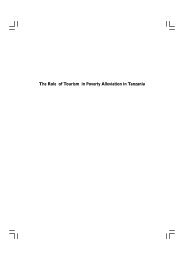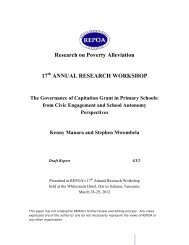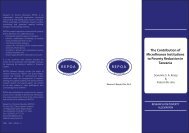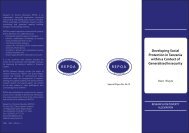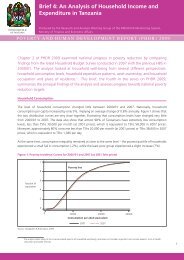Energy, Jobs and Skills - Repoa
Energy, Jobs and Skills - Repoa
Energy, Jobs and Skills - Repoa
You also want an ePaper? Increase the reach of your titles
YUMPU automatically turns print PDFs into web optimized ePapers that Google loves.
Public/private partnerships are not without their challenges however, not least during the<br />
current global financial crisis. The Artumas Group has been severely affected by the global<br />
recession that began in 2008, with the value of their stocks plummeting from USD $10.8 in<br />
April 2008 to USD $0.12 in March 2009 21 . The company’s asset valuation dropped by USD<br />
$68 million in December 2008, <strong>and</strong> Barrick International 22 has since pulled out of the TanGen<br />
project, leaving it short of nearly USD $400 million required for completion. The Artumas<br />
Group has requested consideration of a Tanzanian Government bailout of USD $7 million 23<br />
in operational funding, <strong>and</strong> has advised the Government that the Mtwara <strong>Energy</strong> Project is<br />
in financial distress.<br />
Artumas is not the only energy company in Tanzania to have been affected by the global<br />
financial crisis. The Kiwira Coal Project (a USD $200 million project, expected to generate<br />
some 200MW) has also stalled, as has a USD $250 million Swedish bio-fuel project.<br />
There have also been significant management challenges within Artumas, with its global<br />
founding president being forced to retire in March 2009, <strong>and</strong> the termination of their Tanzania<br />
Managing Director in March 2009. It is believed that in spite of the global financial crisis,<br />
Artumas Group’s operations in Tanzania had been diverted from the establishment of<br />
TanGen (expected to generate quick returns) to the export of compressed natural gas from<br />
Mtwara to Kenya 24 . However the latter project has since been shelved as the Kenyans have<br />
opted out.<br />
Experience globally 25 indicates that to improve such public-private arrangements in the<br />
provision of services to all segments of communities (including the poor) with utility access<br />
such as electricity, a legal framework is required that acknowledges the right to the service,<br />
ensuring that access is the primary objective. This has been more often the case in water<br />
supply than in electricity access (e.g. South Africa’s Bill of Rights 1996 <strong>and</strong> Water Services<br />
Act of 1997). The International Centre for the Settlement of Investment Disputes (ICSID)<br />
arbitrates on many cases, including a caseload of 11 pending disputes in the electricity<br />
sector, 5 in the gas sector, <strong>and</strong> 8 in the water sector. In order to prevent breaches of<br />
contract, or other disputes from arising, transparency <strong>and</strong> open participation are crucial.<br />
Legitimacy begins with the underlying legal framework, <strong>and</strong> it would seem that for Mtwara,<br />
<strong>and</strong> natural gas resources, this still needs to be put firmly in place.<br />
21<br />
22<br />
23<br />
24<br />
25<br />
The East African April 2009<br />
The East African March 2009<br />
Ibid, a Canadian based Gold Mining Company who had planned to be a major investor in the new electricity supply from<br />
TanGen.<br />
A 2007 feasibility study revealed that this would involve commissioning compression <strong>and</strong> loading facilities from Mtwara<br />
Harbour. Although it received government approval in Sept 2008 it required major capital investment.<br />
International Poverty Centre, 2008<br />
18


